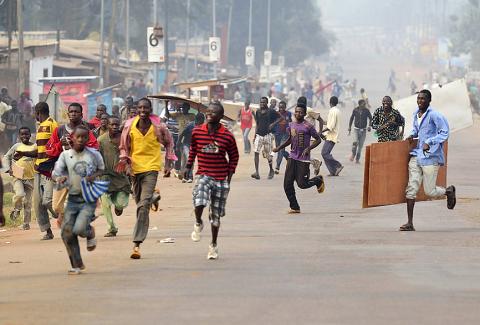Rival militias in the Central African Republic today laid down their weapons and begged each other for forgiveness, despite reports of cannibalism and fresh atrocities in the wake of President Michel Djotodia’s resignation.
The rare moment of reason came as the Red Cross said that 13 people had been killed in a second night of clashes between mainly Muslim Seleka rebels and their rival Christian militias.
CAR chief of staff General Ferdinand Bomboyeke confirmed witness accounts of the laying down of arms which he said occurred after a “deal obtained” by the rivals fighting for days in a southern part of Bangui called Bimbo.
The fighting had involved men belonging to the mainly Muslim ex-Seleka rebels who brought Djotodia to power in March and Christian anti-balaka militiamen.
It was the first scene of this kind in Bangui following weeks of bloody sectarian violence.
The truce occurred after members of the French force in Bangui came to carry out a mediation effort, Roger Kombo, a CAR official said.
The fighters “hugged each other. They asked for forgiveness as people cheered,” Kombo told AFP.
The fighters from both sides then went together to the neighbourhood market and re-opened the checkpoint, allowing people in the area to travel about freely again, he said.
The neighbourhood Seleka commander, Captain Souleimane Daouda, told AFP that “we reached a ceasefire” with the anti-balaka militiamen in the area.
“There were negotiations all night. Early this morning we met. We told each other that we had no reason to fight since Djotodia is gone. We await instructions from the future authorities.”
The National Transition Council, or provisional parliament, said it will on Monday begin its consultations with politicians and civil society members in a bid to elect Djotodia’s successor.
The council’s speaker, Alexandre-Ferdinand Nguendet, is tasked with convening a special session of the parliament to elect a new temporary president.
The council’s deputy speaker Lea Koyassoum Doumta sketched out the criteria the new president must meet.
“He must be someone who can unite Central Africans, restore security, ease tensions, put everybody back to work, and pave the way for free, democratic and transparent elections,” she told AFP.
Doumta said he must also “reassure” the ex-Seleka rebels as well as the anti-balaka groups formed to defend against and avenge the excesses committed by the former rebels.
The new president will inherit a country in turmoil with a climate of sectarian hatred, nearly a million people displaced in a country of 4.6 million, an unprecedented humanitarian crisis, a paralysed government administration and an economy in chaos.
He will have little time to work magic even if he benefits from the political, military and financial support of the international community; the timetable for the transition calls for general elections to be held no later than the first half of 2015.
But France, the former colonial power which is spearheading international efforts to end the crisis here, wants elections to be held as early as the end of 2014.
Under the constitution that came into force when Djotodia came to power, the transitional president is excluded from running in the elections.
Despite the positive developments, there was still looting Sunday. Near the 20,000-capacity stadium in the centre of the capital, a gang of young men armed with machetes and clubs attacked a store, prompting the robust intervention of Congolese troops serving in the African peacekeeping force MISCA, an AFP correspondent said.
The Congolese troops chased the looters and arrested four of them unceremoniously.
Similar incidents of looting, involving gangs wandering throughout the city in search of homes or stores to rob, were reported in other neighbourhoods of Bangui.
Ten months of violence have displaced a fifth of the country’s population, and the sectarian flare-up has killed more than 1,000 people in the past month alone, despite France’s military intervention and the presence of the African peacekeeping force.
France has deployed 1,600 troops in the country to support MISCA, which is meant to have up to 6,000 troops but has not yet reached 3,500.
AFP/Canadajournal
 Canada Journal – News of the World Articles and videos to bring you the biggest Canadian news stories from across the country every day
Canada Journal – News of the World Articles and videos to bring you the biggest Canadian news stories from across the country every day



